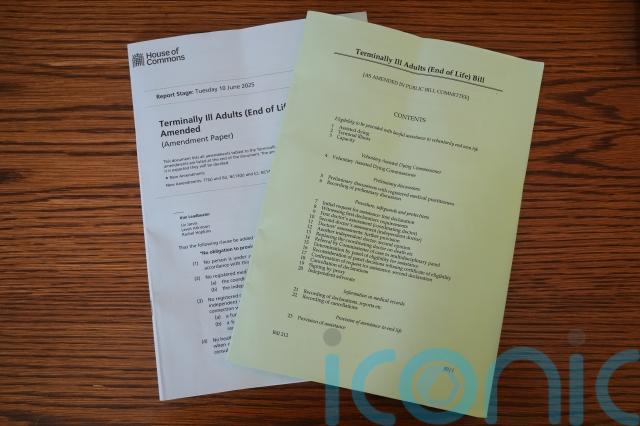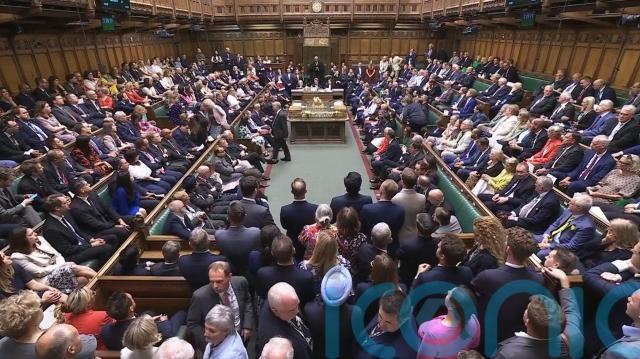
The assisted dying Bill will be debated in the House of Lords for the first time on Friday.
Here, the PA news agency takes a look at how things might progress.
– What is happening on Friday?

The Terminally Ill Adults (End of Life) Bill returns to Parliament, this time to the upper House, known as the Lords.
Those who sit in the House – who are unelected and known as peers – will be able to debate the Bill in the chamber for the first time.
This is known as Second Reading stage. The First Reading was procedural only and took place in June without debate.
Friday will be the first of two days of debate, with September 19 also set aside for Second Reading.
A key role of the Lords is as a revising chamber, carefully scrutinising draft laws line-by-line, and telling MPs to “think again” when they feel it necessary.
The Bill will be taken through the Upper House by former lord chancellor and justice secretary Lord Falconer of Thoroton, taking the baton from Kim Leadbeater who sponsored the Bill in the Commons.
With some 190 peers having put their names down to speak across the two days, it is thought this could be a record-breaking Second Reading debate, beating the number who spoke at the same stage of the EU Withdrawal Bill – when 187 had their say.
The number who ultimately take part could rise further still as members whose name is not on the published list may be able to take part by “speaking in the gap” before the winding-up speeches, but in this case they are expected to be brief.
– Will there be a vote on Friday?
Not on the first of the two days of debate, but possibly at the end of next week.
There is always a motion to agree Second Reading at the end of the debate – likely on September 19. That is not usually put to a vote in the Lords but it can be.
Although unlikely, if the Lords votes against the Bill it falls and would have to start all over again in the next session of Parliament.
MPs in the House of Commons have voted twice on the overall Bill, approving the principle of assisted dying.
This Bill is known as a backbench or so-called private members’ Bill (PMB), rather than official Government business.
With less time allocated compared to other Government legislation, the chances of a PMB completing all parliamentary stages are reduced and it can be more vulnerable in the face of any delays.
The Government can make additional time available to enable discussion of a PMB if it wishes, but this is unusual.
– What has happened to get us to this stage?

This is the furthest assisted dying legislation has progressed in the Westminster parliament to date.
MPs had two overall votes on the Bill – one at Second Reading stage in November 2025 which passed by a majority of 55, and another to approve it at Third Reading.
That vote, in June, saw the majority narrow to 23.
Between Second and Third Reading, the Bill also went through line-by-line scrutiny in a weeks-long committee session which saw some changes made, and was subject to a report stage which saw further amendments.
– What is in the Terminally Ill Adults (End of Life) Bill?

The proposed legislation would allow terminally ill adults in England and Wales, with fewer than six months to live, to apply for an assisted death.
This would be subject to approval by two doctors and a panel featuring a social worker, senior legal figure and psychiatrist.
The terminally ill person would take an approved substance, provided by a doctor but administered only by the person themselves.
– What further changes might be made to the Bill?
It is possible for peers to lay amendments at Second Reading. While this is infrequent, it is not unheard of.
Some have previously said safeguards in the Bill as it stands to act against coercion are not strong enough, so there might be attempts to change or add things to that end.
A report from a Lords committee on Monday also suggested parts of the current Bill hand too much power to ministers and appear to “sidestep parliament” over issues including which drugs should be used in assisted dying.
– Will assisted dying definitely be legalised in England and Wales?

Not definitely. The clock is ticking with the current parliamentary session due to end next spring.
Bills which do not make it through both the Commons and Lords in that time to become law fall and have to begin the legislative process from scratch, unless special arrangements are made.
If it does progress through Second Reading stage, this is followed by committee, report and Third Reading stages in the Lords, then consideration of amendments in the final stages and lastly Royal Assent.
Assisted dying will only become law in England and Wales if both the House of Commons and House of Lords agree on the final wording of the Bill.
If it does pass into law, the Government has four years in which to get an assisted dying service into place – meaning it could be 2029/30 before the first assisted death took place.
– What hold-ups could the Bill face?
The legislation is contentious and as such will be the focus of in-depth, lengthy examination, with opinion likely to be divided over the level of scrutiny it has been subject to.
By convention, the Lords as an unelected chamber would not ordinarily block legislation introduced by a government, whose plans have been endorsed by voters.
But as a backbench Bill, with this current Government having declared it is neutral on the issue, some members may feel more free to oppose and frustrate its passage through the Upper House, especially given the slimmer majority it eventually cleared the Commons with.
This raises the possibility of filibustering or “talking it out”, where critics speak at length on each part of the Bill as part of an aim to run down the clock given the timescales involved.
Another tactic that could be employed by opponents is the “degrouping” of amendments, serving to increase the number debated and so hinder its progress.
While changes to draft legislation are a normal part of proceedings in the Lords, such as seeking safeguards and assurances, there are also so-called “wrecking amendments” aimed at derailing a Bill by altering or stripping out its key goals.
Revisions made to the Bill would have to be sent back to the Commons for consideration as part of the ping-pong process where legislation is batted between the two Houses until agreement is reached, raising the prospect of a further impasse.
Subscribe or register today to discover more from DonegalLive.ie
Buy the e-paper of the Donegal Democrat, Donegal People's Press, Donegal Post and Inish Times here for instant access to Donegal's premier news titles.
Keep up with the latest news from Donegal with our daily newsletter featuring the most important stories of the day delivered to your inbox every evening at 5pm.